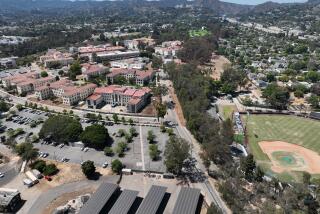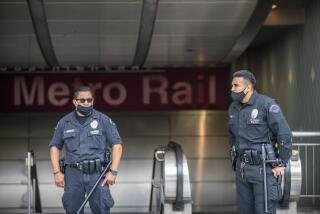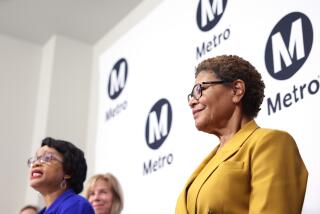Judge Rejects MTA Request to Overturn Order to Buy Buses
- Share via
Chief U.S. District Judge Terry J. Hatter Jr. on Tuesday decisively rejected arguments by the Metropolitan Transportation Authority’s lawyers that neither the federal courts nor a special master have the power to order the transit agency to buy more buses to relieve overcrowding on its lines.
At the close of a six-hour hearing held over two days, Hatter told a hushed courtroom that the MTA only questions the authority of Special Master Donald T. Bliss Jr. when it disagrees with his decisions.
And Hatter pointedly disputed the MTA’s contention that he and Bliss lack the authority to order the transit agency to remedy violations of the consent decree that it negotiated and signed to settle a federal civil rights case filed by advocates for the bus riders.
Hatter said the MTA can choose to be on the same side as “former segregationists” challenging the authority of the federal courts. But he said the only decision facing him was whether Bliss’ order to buy more buses was clearly erroneous. “I am not convinced that is so,” Hatter said.
In a strong but measured voice, the judge served notice that he would review and possibly modify Bliss’ order. But he said, “The plaintiffs are quite right” that it is not fair to argue, as the MTA has, that no constitutional issues are involved in the enforcement of the landmark consent decree.
The agreement signed in October 1996 is “very explicit in its terms” to remedy violations of overcrowding standards, Hatter said. He gave both sides a week to submit possible findings for his ruling on the MTA’s motion to set aside Bliss’ ruling.
Civil rights attorney Constance Rice, representing the NAACP Legal Defense and Educational Fund and the Bus Riders Union, told Hatter that the case before him was about “some of the poorest people in Los Angeles County” who are completely dependent on the MTA for transportation and suffer day in and day out from overcrowding.
Bliss found massive violations of the consent decree and ordered the additional buses to relieve that overcrowding.
Rice said the MTA “recklessly developed rail in a way it couldn’t afford” and “did so on the back of bus riders.”
Hatter seemed to take particular exception to the closing argument by MTA attorney Shirley M. Hufstedler. The former federal appeals court judge and education secretary in the Jimmy Carter administration said portrayal of the case as a “big fight between haves and have-nots” was incorrect. “It makes a dramatic story, but it has nothing to do with the real issues before your honor.”
She said the U.S. 9th Circuit Court of Appeals and the U.S. Supreme Court have ruled that a federal court cannot dictate to a local agency unless there has been a constitutional violation and a showing of recalcitrance. That is not the case with the MTA, she argued.
What “kind of nonsense and irresponsibility is it,” she asked, to have to buy more buses “on lines that are already 100% in compliance with the load factor?”
The other side called longtime bus rider Maria Guardado to testify.
She said in Spanish that she has seen no improvement in the MTA’s bus service.
More to Read
Sign up for Essential California
The most important California stories and recommendations in your inbox every morning.
You may occasionally receive promotional content from the Los Angeles Times.










